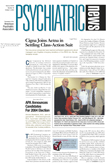For more and more students, going to medical school in the wired world of the Internet promises to be a “paperless” experience.
Meet Griffin Weber, for instance, a fourth-year M.D./Ph.D. student at Harvard Medical School. No longer does he consult a large course book every day for each one of his courses to find lecture schedules, assignments, test dates, and other materials.
That’s what he used to do, before Harvard introduced MyCourses, an individualized web portal with administrative background materials, course content, learning tools that complement and even interact with the classroom experience, and virtually everything else the student needs from the time he or she enters school.
“Before MyCourses, I would have to flip to the calendar in each of my course guides for the lectures and assignments for each of the classes,” Weber told Psychiatric News. “A lot of time was wasted going through all that paper. MyCourses puts all the content online and combines the information so that I have an electronic calendar I can go to on any particular day to see all the tests and surveys I have to complete for my different classes, all in one location.”
John Halamka, M.D., chief information officer at Harvard Medical School and dean for educational technology, said MyCourses went “live” in May 2002.
“We had a lot of different Web pages used for different purposes, but we didn’t have a unified environment so students and faculty could go to one place,” Halamka told Psychiatric News. “What we have created is a Web-based paradigm that covers you from the time you enter medical school through graduate medical education and continuing medical education—from birth to death, so to speak.”
A similar portal called MyResidency has been created for clerkships, and today the entire system is used 40,000 times a day, Halamka said.
Online Systems Expected to Profilerate
Educators say that sooner or later—depending on the resources a medical school has to dedicate—the “paperless” curriculum is coming to all medical education.
“It is definitely the wave of the future,” said Lowell Tong, M.D., director of medical school education for the department of psychiatry at the University of California San Francisco (UCSF). The idea is that more and more of the curriculum, as well as course rosters, administrative backup material, and learning tools can be online, instead of using the traditional paper-based syllabus, textbook, and schedules. It doesn’t replace human contact, but it augments it in ways we couldn’t do before.”
Tong said UCSF has substantially revised its curriculum—the result of a lengthy “soul searching” about the school’s educational goals and objectives—and a component of that process has been the move to a digitally based curriculum.
System Augments Learning
IRocket is the school’s answer, an online portal for medical students and residents providing—like MyCourses—almost everything that formerly was distributed to students in reams and reams of paper.
One thing the paperless curriculum is not, both Tong and Halamka said, is a replacement for the traditional classroom, laboratory, and clinical rotation experiences.
“This is an adjunct,” Halamka said. “Students go to class, stay in class, and take notes in class. It isn’t distant learning, and you can’t get a medical degree on the Web.”
The most fully realized form of the paperless curriculum—such as those developed at Harvard and UCSF—uses online learning tools that are dynamic and can be used in real time in the classroom.
“MyCourses is actually part of the class,” Weber told Psychiatric News. “In tutorial rooms we have large monitors on the wall so that while we are discussing a case, we can pull up the New England Journal of Medicine for related articles or the faculty can pull up X-rays related to the case.”
Further, MyCourses includes an interactive tool for online study of human systems, called Human Systems Explorer. With the explorer, students can view simulations of human body systems and how those functions dynamically affect other organic systems as students manipulate them.
“The Human Systems Explorer allows you to see in real time how things are changing,” Weber said. “You can modify the parameters so that, for instance, the heart beats at different rates, and you can see how a changing heart rate affects other systems.”
Psychiatry students at UCSF use a similar learning module that allows them to view the dopamine circuitry in the brain: The user points the cursor to dopamine receptors at various sites in the brain, and up pop projections of the circuitry.
IRocket also offers a posting section for what Tong said is a “very active exchange of information from student to student,” as well as real-time discussion groups.
The latter may be focused around classroom lectures or online cases, and offers a venue for interactive learning that replaces the five or 10 minutes of discussion that would traditionally be allotted after a lecture, Tong said.
Ensures Objectives Can Be Met
Tong said the neurology and psychiatry clerkships at UCSF are developing Web-based learning modules “to make sure every student has a learning opportunity to master the core objectives.” Among these will be streaming videos of patient interviews.
“A student may encounter a caseload of patients at clerkship site that may not represent the learning objectives,” Tong said. “If a student has a clerkship at a site where there isn’t a lot of schizophrenia, there will be a schizophrenia case online to supplement the caseload.”
Tong and Halamka said that ultimately the paperless curriculum holds out the promise of a new kind of educational community.
“It isn’t just a curriculum,” Halamka said. “It’s a place where people exchange ideas, an infrastructure that ties together the entire medical educational experience.”
